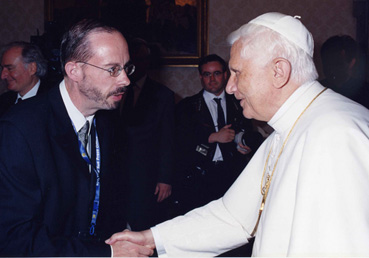By Ed Hayward
The Boston College Chronicle
May 10, 2010
http://www.bc.edu/publications/chronicle/TopstoriesNewFeatures/news/Allen2051010.html
 |
The world’s focus on the clergy sex abuse scandal has overshadowed the work Pope Benedict XVI has done to bring about reform on the issue, as well as obscured discussions about other powerful forces shaping the future of the global Catholic Church, John L. Allen, Jr., an award-winning senior correspondent for National Catholic Reporter and best-selling author, said during a speech at Boston College.
To Allen and others who have covered the Vatican’s response to the clergy sex abuse scandal for nearly a decade, that this particular Pope has become a symbol of the crisis is a “though the looking glass” portrait almost entirely at odds with the record of the former Cardinal Joseph Ratzinger to get the church to confront the crisis, said Allen, speaking to an audience of nearly 500 people in Conte Forum on May 5 at an event sponsored by BC’s Church in the 21st Century Center.
“For those of us who have followed the arc of this story for the last decade, the notion that Pope Benedict XVI could become the global symbol of the sexual abuse crisis is absolutely surreal,” said Allen, also a Vatican analyst for CNN. “For those of us who have covered the crisis, in truth, we know the situation is exactly the reverse of the impression that has been created in much public discussion.
“The truth is that since 2001 no senior official in the Vatican has done more to weed abuser priests out of ministry and acknowledge the suffering of victims than the former Cardinal Joseph Ratzinger,” Allen told the audience.
Overlooked have been the Pope’s efforts to move Vatican policy on the issue, including changes to cannon law in 2001 that assigned responsibility for dealing with the crisis; the implementation of new procedures to remove abusive priests from ministry; disciplining two senior Roman priests; and becoming the first Pope to meet with victims of sexual abuse – something he has done four times.
“In general, he is responsible for, in effect, breaking the Vatican’s wall of silence,” said Allen, the National Catholic Reporter's Rome correspondent since July 2000 and the author of six best-selling books on the Vatican and Catholic affairs, including his most recent The Future Church: How Ten Trends are Revolutionizing the Catholic Church.
That doesn’t mean there are not significant issues the Church needs to confront in the abuse crisis, he said. The absence of uniform policies and procedures dealing with abuse allegations and abusers, accountability for Bishops and clearer rules for cooperation with civil authorities all need to be addressed, Allen said.
Calling the Vatican’s effort to tell the Pope’s story “remarkably inept,” Allen said the scope and severity of the clergy sex abuse crisis has overshadowed significant developments such as the growth of the church in the developing countries of the Southern Hemisphere, new developments in the relationship of the Church to Islam and the impact of the changing dynamics of a “multi-polar” world on spirituality, organized religion and the Church itself.
“The most toxic consequence of the current crisis is that it makes it almost impossible to talk about anything else regarding the Church,” Allen said. Primary among the forces at play in the future of the church is the population explosion in the Southern Hemisphere. In 1900, of the world’s 266 million Catholics, 200 million lived in Europe and North America. By 2000, the world’s Catholics numbered 1.1 billion, with 720 million living in the developing regions of Asia, Africa and South America. By 2050, he said, three out of every four Catholics will live in what Allen calls the Global South.
“This is the most rapid, most profound, most sweeping transformation of Catholic demography in 2,000 years of Church history and we are living through it right now,” Allen said. Allen’s books include All the Pope’s Men: The Inside Story of How the Vatican Really Thinks and, about the current pope, Cardinal Ratzinger: The Vatican’s Enforcer of the Faith and The Rise of Benedict XVI: The Inside Story of How the Pope was Elected and What it Means for the Catholic Church. He writes frequently on the Church for major national and international publications, and his weekly internet column, “All Things Catholic,” is widely read as a source of insight on the global Church.
"John Allen is one of the most experienced and insightful observers of the Church in our time,” said John McGinty, director of the Church in the 21st Century Center. “ Particularly in these days, when from Europe outward through the Catholic world there are waves of profound disturbance, it is good for us locally to have the opportunity to hear what a journalist of John’s background and experience has to say, and to have the chance to respond."
The Church in the 21st Century Center is an outgrowth of BC's Church in the 21st Century initiative, which began in 2002 as the first response of any university to the clergy sexual abuse crisis. After two years of national and localized symposia, lectures and conferences, publications, and other resources, a permanent Center was established in 2004 to reflect Boston College's continued commitment to the exploration of issues facing the Catholic Church.
Any original material on these pages is copyright © BishopAccountability.org 2004. Reproduce freely with attribution.